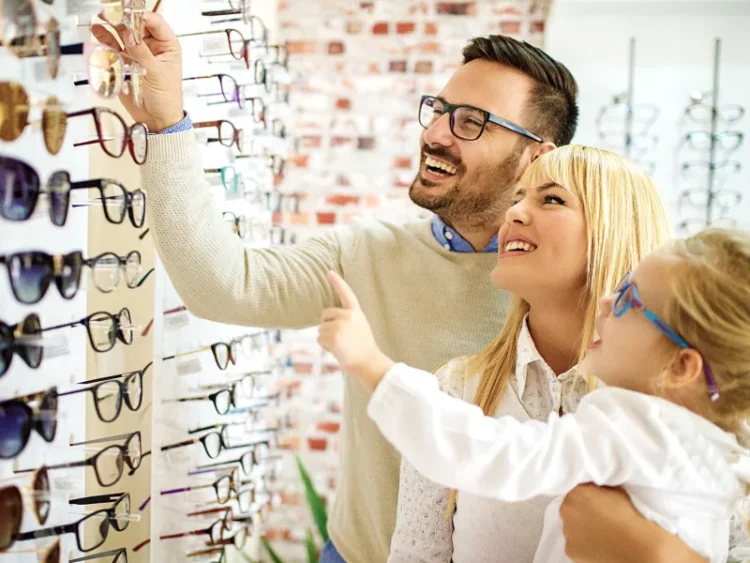Thirteen million NHS sight tests are provided across England each year. These tests are essential as they help to identify any potential eye disorders so that vision correction can be recommended accordingly.
Eye disorders can be genetic or might develop with age. Some eye disorders are presbyopia, hyperopia (far-sightedness), myopia (near-sightedness), glaucoma, cataracts, and macular degeneration.
On the other hand, genetic eye conditions include conditions, such as color blindness, keratoconus, albinism, and more.
A lot of factors can contribute to affecting your eye health:
Age
With age, eyes tend to become weak and result in age-related vision problems, such as glaucoma, presbyopia, etc., meaning these problems become more frequent with age.
Genetics
If a person has a family history of an eye condition such as keratoconus or color blindness, they’re likely to have the same eye condition. For instance, a person with a family history of glaucoma is 4 to 9 times more likely to possess the same vision disorder.

Chronic health conditions
Health conditions such as diabetes or high blood pressure can cause damage to the blood vessels of the retina, which might lead to vision loss and blindness.
Behavioral factor
Behavioral factors such as smoking, an unhealthy diet, and physical inactivity can have a significant effect on your eyes.
Eyecare for you
Most people don’t think about protecting their eyes before they experience an eye problem. You must always be very vigilant and mindful of your eye health. The slightest of issues with your eyes should be attended to seriously. To correct any refractive errors, you can opt for glasses or contact lenses; you can even opt for laser eye surgery if you do not prefer wearing any visual aid accessories.
People often get confused about what they should opt for – glasses or contact lenses. Well, both have their advantages; the choice of optical depends on person to person. Contact lenses are easy to wear without having to wear anything extra on your face (basically, if you dislike glasses, go for contact lenses); glasses are a one-time buy. You do not need to buy new ones every week/month, like contact lenses, unless your prescription has changed.
If you’re looking for a reputable platform to order your prescription glasses online, get them from FeelGoodContacts, UK’s best online contact lenses retailer. They are the most affordable eyewear retailer you can find on the market. Select from your favorite brand, filter according to your price range, try them on virtually and order from the comfort of your home! Make sure to take advantage of their up to 70% off exclusive summer sale.
Myths connected with glasses

Glasses were invented before contact lenses, and they come to the mind first naturally when it comes to correcting vision. However, there are myths associated with glasses that need to be addressed. We do not want to get carried away with what is not true! Understanding reality vs myth is essential.
- Myth 1 – Eye exercises can prevent you from needing glasses
While eye exercises can be beneficial, they cannot prevent you from needing glasses.
- Myth 2 – Bad/poor-fit glasses can damage your eyesight
Not true; ill-fitting glasses do not damage your eyesight. A good fit is recommended for comfortable wear.
- Myth 3 – Wearing non-prescription glasses can damage your eyesight
Non-prescription glasses mean they have no power in them; they are simply for cosmetic purposes. Hence, they can’t damage your eyes.
- Myth 4 – Glasses make you look geeky
This is not at all true. Those days are gone when people were bounded to wearing thick-framed geeky glasses. Now you have loads of options to choose from, style as you like! You can opt for fabulous eyeglasses depending on your face shape, favorite brand, price, color, and more. There are loads of filters you can take advantage of.
Maintain Healthy eyes

As they say, prevention is better than cure. One should always be mindful of healthy eye habits and stay on top of the game. Here are some best ways to take care of your eyes:
Eat a balanced diet
The rule of thumb for almost every body-related problem is consuming a balanced diet. You can include food rich in omega-three fatty acids, such as salmon, leafy greens such as kale, broccoli, collards, nuts, and seeds. Also, make sure to drink plenty of water.
Limit your screen time
The harmful rays from electronic devices can damage your eyes, and long hours in front of the screen won’t do you any good; opt for Blue Light glasses to protect your eyes. It is important to limit your screen time, if your profession keeps you glued to the screen all day long, then you must take breaks between your work. There are many exercises, such as blinking, that can help relax your eyes from too much screen time.
Keep your hands clean
It is a bit difficult when it comes to keeping your hands off your eyes, but it’s best to avoid touching them with your hands. Your hands can transfer the bacteria into your eyes when you touch them, causing eye infections.
Regular eye check-up
It is recommended to get your eyes checked every two years or as suggested by your optician. Going for regular eye check-ups can help you diagnose any developing eye problems and save you from a lot of eye trouble.
Make sure to keep your eye health on the top of your list as it is eye-essential!
 Hi Boox Popular Magazine 2024
Hi Boox Popular Magazine 2024



